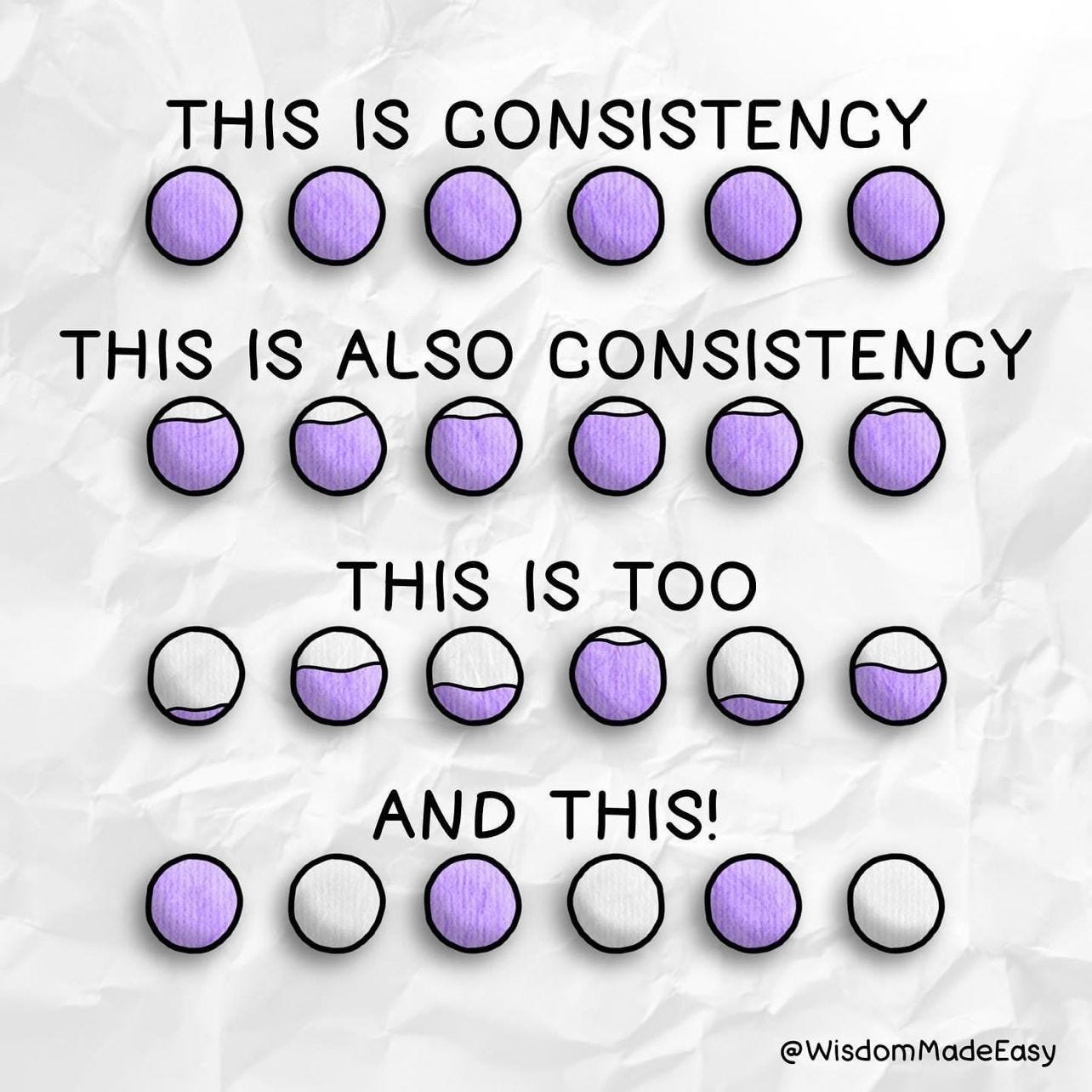#82🧘🏽 Redefining What Consistency Means to Practice Better Self-Care
Consistency has many more forms that you think.
Welcome to Tech Atypically 👋, your weekly blog for navigating the challenges of ADHD and being in the tech industry.
I am an ADHD and product management coach helping you change one belief and take one action each week.
🐼Are you struggling at work and fear the worst? Talk to a team of experts that can help.
Part 6 of the Self-Care Series
🦋The Takeaways
Belief: Self-care must be perfect or it's not worth doing.
Reality: Consistency has many forms.
Action: Start small and be forgiving with your self-care routine.
⭐️Introduction
Have you ever started a self-care routine only to abandon it after missing a day? This all-or-nothing thinking about self-care is common when you have ADHD. You start with a grand vision and as soon a speck of hits it, you quit.
This week, I explore how this mindset limits you and how embracing imperfect self-care can open you to a world of possibilities.

😵💫The Belief – Self-care must be perfect or it's not worth doing
If you're like me, you might often find yourself trapped in binary thinking about self-care. You're either following your routine perfectly or you've failed completely. This mindset can be paralyzing, preventing you from starting or maintaining self-care practices.
For example, you might avoid restarting your meditation practice after missing a day because you believe the only outcomes are perfect consistency or total failure. Your desire for change is a replaced with shame and failure.
You should be a better person.
You should be more consistent.
You failed again.
You quit again.
This fear of imperfection can lead to abandoning self-care altogether. Leading to the outcomes you were trying to avoid; increased stress and decreased well-being.
🤝The Reality – Forms of consistency
The reality is you and I have a false perspective of what consistency is. We think consistency doing the thing we set out to do, exactly the way we imagined it to be, without fail.
The reality, consistency takes many forms and you change it to what you need it to be. Take a look at the image below.
I like this chart because it’s a good reminder that while make ADHD may make me feel like consistency is only line 1, there are many different forms of consistency.
It’s OK that I missed a day or week of a routine. That miss or not achieving the target I set doesn’t meant my consistency streak is dead.
I have the power to be consistent and to define what this is based on what I need. I thought about missing this week’s newsletter because I was on vacation.
I decided I needed to write because I needed to process where I am sitting right now (more on that in the conclusion).
I’m 4 days passed my Sunday publication date but I’m still a consistent writer. I still showed up but it was when I needed to, not when I should.
🛠️The Action – Start small and be forgiving with your self-care routine
Here are five strategies to help you be more consistent in the ways you want and need to be.
Reframe your thinking about self-care consistency: Instead of aiming for perfection, focus on progress over time and making the next move, no matter how small.
Example: If you miss a day of exercise, instead of giving up, tell yourself, "Every bit of movement counts. What small activity can I do today?"
Start with tiny, achievable self-care habits: Focus on making things just 3% better each day.
Example: Begin with just one minute of deep breathing daily, then gradually increase as it becomes a habit.
Use "if-then" planning for self-care: Prepare for obstacles by having alternative plans ready.
Example: "If I don't have time for a full workout, then I'll do a 5-minute stretching session instead."
Create a menu of flexible self-care routines: Instead of rigid schedules, have a menu of self-care options to choose from based on your energy and time.
Example: Have a list of self-care activities ranging from 2-minute to 30-minute options, and choose based on your current capacity.
Broken process, not broken people when you miss a routine: If you notice your routine isn’t going the way you want it to, treat it as a flaw in your strategy instead of you inability to do it.
Example: If your goal was to journal five days a week, but you find yourself only able to do it one day a week, ask yourself what’s missing from your environment to allow you to write the other days.
✨Conclusion
Breaking free from perfectionist thinking about self-care isn't about changing who you are – it's about changing how you approach your well-being. By opening yourself to the possibility that consistency is more than perfectionism, you create space for growth and change.
You learn to accommodate yourself rather than chasing an ideal that doesn’t really exist.
In case you’re wondering where I am right now…
I’m sitting in a social security benefits office in Lexington, Kentucky with my parents and estranged and homeless brother. I’m here as support to my mom as she tries relieve herself of my brother’s disability benefits management to prepare for eventual passing. I’m also here because he poses a physical danger to both my parents.
It’s a lot more to process than I expected sitting in this hard plastic chair. Occasionally staring up the TV screen hoping that our number will be there and we can all leave this purgatory.
That’s why I needed to write this week.
🐼Join other tech professionals learning how to thrive at work with their neurodiversity.
⏭️Next Week
A guest post from Katie Ferrell.



The adhd urge to put my head down to help a fellow adhd substacker solve his time vs money problem… 🫠
Do you have a PA/VA by any chance? To delegate some of the low dopamine tasks?